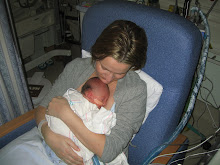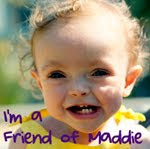In my last post, I said we'd had an intense appointment with Sam's pediatric neuro-opthamologist (who, because we trust him so implicitly, and because we think he's a genius, I've dubbed "Super Doctor"). We got a lot of new information. . . information I don't think we are totally sure what to do with yet.
For a very long time, we've noticed that when Sammie B is not focusing on anything in particular, her eyes occasionally drift upward . . . but then she immediately pulls them back to center. Super Doctor finally saw it during our last visit to him, and he got really quiet [Note: internal freaking out in mother anytime doctor gets quiet and scratches his head as if in deep thought]. After the quiet, he said, "okay, so things are starting to make a lot of sense here." It turns out he's NEVER seen it before [not what a mother likes to hear, especially considering he's been around a LONG time and is very preeminent in the field] but he knows what it is . . . some super small part of Sam's cerebellum that controls a lot of eye movement (pursuit) isn't functioning correctly. He's optimistic that that part of her brain (too small to show up in an MRI, hence our normal MRI results) is just delayed in developing, and that even if that's not the case . . . the rest of her cerebellum will eventually learn to accommodate (that's the whole concept of neuro-plasticity, where our brain forms alternative pathways where one pathway is deficient).
He actually said that this is a HUGE part of her motor delays, and just encouraged me to be patient. He said that motor skill wise we'd be better off if she were blind (scary to hear) b/c we'd use her other senses to motivate her to move, but with her, she's VERY visual, and seeing everything, but sometimes coordinating movements w/ what her eyes are seeing is just super hard . . . hence her motor delays (on top of the low-tone, which totally meshes with what the neurologist recently said . . . her motor delays seem worse than her tone). Anyway, he assured me that (1) he's not panicking but to the contrary, he feels very reassured that things are coming together and medically, it all makes sense and (2) that Sam WILL get there . . . albeit late late late . . . and that she may never be a tennis player (so outside of what I care about, but he said you wouldn't believe the parents that get upset when he says their kids will not ever have the hand-eye coordination to play baseball. Get a real concern, right!). He's going to follow her closely, and we have another appointment with him in May where we are going to sit and talk at greater length about what all of this means. He's also going to video the eye movements and present her case to his colleagues, which makes me feel even more reassured. I just feel like the more people we have working with us, the more promising future that lies ahead.
I do feel reassured, but of course there's that part of me (I've managed to stay off google for the most part; I promised Super Doctor I would) that worries that this is an indicator of something serious. It makes me nervous that he's never seen it in a patient. He did say however, that in monkey studies, where they've damaged this part of the monkeys' brains, and then observed, the monkeys do just gradually get better over time, because the other parts of their cerebellums accommodate . . . interesting! When he said, "I've never seen this in a patient, but have seen it in monkey studies," my little monkey LAUGHED out loud. She's definitely got a funny sense of humor.
Anyway, it is a little scary that the best "data" he had for me was about monkeys, but I also tell myself that without a person to compare her to, that means the SKY is the LIMIT.
Sunday, April 11, 2010
Subscribe to:
Post Comments (Atom)



1 comment:
Wow, just as you said, that is intense. Try to stay patient and you know that therapy and stimulation will help with the neuro-plasticity. I totally agree though...stay away from Google. It's my worst enemy!!
Post a Comment